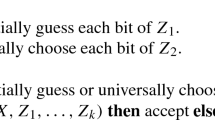Abstract
In the BSS model of real number computations we prove a concrete and explicit semi-decidable language to be undecidable yet not reducible from (and thus strictly easier than) the real Halting Language. This solution to Post’s Problem over the reals significantly differs from its classical, discrete variant where advanced diagonalization techniques are only known to yield the existence of such intermediate Turing degrees.
Then we strengthen the above result and show as well the existence of an uncountable number of incomparable semi-decidable Turing degrees below the real Halting problem in the BSS model. Again, our proof will give concrete such problems representing these different degrees.
Preview
Unable to display preview. Download preview PDF.
Similar content being viewed by others
References
Ben-David, S., Meer, K., Michaux, C.: A note on non-complete problems in NPℝ. Journal of Complexity 16(1), 324–332 (2000)
Blum, L., Shub, M., Smale, S.: On a Theory of Computation and Complexity over the Real Numbers: NP-Completeness, Recursive Functions, and Universal Machines. Bulletin of the American Mathematical Society(AMS Bulletin), vol. 21, pp. 1–46 (1989)
Blum, L., Cucker, F., Shub, M., Smale, S.: Complexity and Real Computation. Springer, Heidelberg (1998)
Bürgisser, P.: Completeness and Reduction in Algebraic Complexity Theory. Springer, Heidelberg (2000)
Cantor, D.G.: Irreducible Polynomials with Integral Coefficients have Succinct Certificates. J. Algorithms 2, 385–392 (1981)
Chapuis, O., Koiran, P.: Saturation and stability in the theory of computation over the reals. Annals of Pure and Applied Logic 99, 1–49 (1999)
Cucker, F.: The arithmetical hierarchy over the reals. Journal of Logic and Computation 2(3), 375–395 (1992)
Friedberg, R.M.: Two recursively enumerable sets of incomparable degrees of unsolvability. Proc. Natl. Acad. Sci. 43, 236–238 (1957)
Hamkins, J.D., Lewis, A.: Post’s Problem for supertasks has both positive and negative solutions. Archive for Mathematical Logic 4(6), 507–523 (2002)
Herman, G.T., Isard, S.D.: Computability over arbitrary fields. J. London Math. Soc. 2, 73–79 (1970)
Hogarth, M.L.: Non-Turing Computers and Non-Turing Computability. Proc. Philosophy of Science Association 1, 126–138 (1994)
Kieu, T.: Hypercomputation with Quantum Adiabatic Processes. Theoretical Computer Science 317, 93–104 (2004)
Ladner, R.: On the structure of polynomial time reducibility. Journal of the ACM 22, 155–171 (1975)
Lang, S.: Algebra, 3rd edn. Addison-Wesley, Reading (1993)
Macon, N., Dupree, D.E.: Existence and Uniqueness of Interpolating Rational Functions. The American Mathematical Monthly 69, 751–759 (1962)
Malajovich, G., Meer, K.: On the Structure of NPC. SIAM Journal on Computing 28(1), 27–35 (1999)
Meer, K.: Real Number Models under Various Sets of Operations. J. Complexity 9, 366–372 (1993)
Post, E.L.: Recursively enumerable sets of positive integers and their decision problems. Bull. Amer. Math. Soc. 50, 284–316 (1944)
Rudin, W.: Real and Complex Analysis. McGraw-Hill, New York (1966)
Schöning, U.: A uniform approach to obtain diagonal sets in complexity classes. Theoretical Computer Science 18, 95–103 (1982)
Soare, R.I.: Recursively Enumerable Sets and Degrees. Springer, Heidelberg (1987)
Yao, A.C.-C.: Classical Physics and the Church-Turing Thesis. J. ACM 50(1), 100–105 (2003)
Author information
Authors and Affiliations
Editor information
Editors and Affiliations
Rights and permissions
Copyright information
© 2005 Springer-Verlag Berlin Heidelberg
About this paper
Cite this paper
Meer, K., Ziegler, M. (2005). An Explicit Solution to Post’s Problem over the Reals. In: Liśkiewicz, M., Reischuk, R. (eds) Fundamentals of Computation Theory. FCT 2005. Lecture Notes in Computer Science, vol 3623. Springer, Berlin, Heidelberg. https://doi.org/10.1007/11537311_41
Download citation
DOI: https://doi.org/10.1007/11537311_41
Publisher Name: Springer, Berlin, Heidelberg
Print ISBN: 978-3-540-28193-1
Online ISBN: 978-3-540-31873-6
eBook Packages: Computer ScienceComputer Science (R0)




